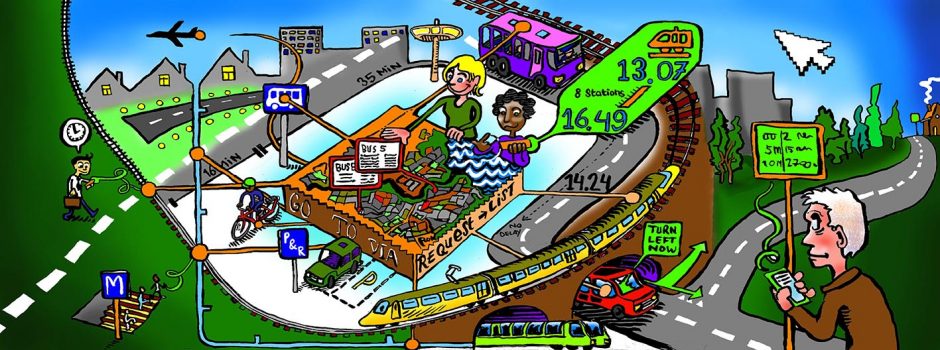Contracting out activities serving smart mobility is common practice. There are risks, however. How does a government keep direction if necessary expertise comes from outside and is even encrypted in software? And how do governments account for their tradeoffs between values such as privacy, sustainability and efficiency?
Key words: contracting out, expertise, integrality accountability, policy rich
‘Municipalities ask for green mobility, but they do not know what green is.’ This blunt statement comes from an entrepreneurial software engineer directly working for Dutch municipalities that want to get involved in smart mobility. His company Mobidot develops track systems for mobile phones and strategies for nudging travellers’ behaviour. It is no surprise that municipalities lack the expertise to develop this software, but the potential of this software is highly relevant. We call it ‘policy rich’, as it integrates different public values, including travel efficiency and sustainability. The interviewee was surprised to hear that the municipalities he worked for were not able to provide concrete definitions of sustainability that companies like his could work with. Instead, definitions of sustainability were developed by himself, informed by the Wuppertal Institute. Is this a problem? Should municipalities as clients know what green is?
Contracting out activities serving smart mobility is common practice. CarFreeAtoZ was commissioned by Arlignton County Commuter Services – part of Virginia Transport Department – to Conveyal, a private developer. Reittiopas was initially developed by a private company and later acquired and internalised by Helsinki’s transport authority. It is of course more efficient to hire specific expertise that is lacking in the short run when it may not be necessary for eternity. Besides that, leaving innovative activities to the market is in vogue. Markets are supposed to excel in innovate services such as the software from Mobidot.
However, empirical evidence shows that the price may be high. The interviewee states that municipalities have a problem of knowledge and direction. Who is the director of smart mobility if knowledge-intensive activities are contracted out? What if vital definitions – for instance about sustainability or about privacy – are hidden in software and informed by considerations from knowledge institutes elsewhere? The Mobidot interviewee took his observation some further. For impacting travellers’ behaviour, the definition of target groups is vital. The municipalities he works with also happen to have a hard time defining these target groups. They rather measure time loss at specific traffic bottlenecks. A paradigm shift from output – traffic – to input – behaviour – still has to be made in these instances. For the time being, the definitions of target groups are also developed by market parties instead of governments.
On the other side, it might be argued that the market does a very good job in developing knowledge on smart mobility, applying it to a wide range of products and selling them to public authorities that are inclined to use them. What is the problem then? We still see two problems, even at the sunny side of the street.
A first problem is about integration. Public authorities are natural actors to integrate values, such as mobility, sustainability, privacy and public efficiency. This indeed is key to their existence. However, in organizational practice this integration means hard work. Transport departments have a hard time coordinating their activities with the department that has knowledge about sustainability, and another department that tackles privacy issues, etcetera. All departments have different definitions, different aims, different histories. As the case of Plan a Journey illustrates, even within a transport authority (TfL) there are several segregated departments that need to coordinate their work for the realisation of the travel advice platform.
The Mobidot interviewee signaled that a new integrative ‘smart city manager’ at a municipality has been trying to define smart mobility for half a year now, without definitive success. This illustrates that the transaction costs of integration can be relatively high. Integration gets even harder, if vital knowledge-intensive activities are contracted out and important definitions are made outside the organization of the municipality, and remain hidden in the software of products municipalities are purchasing.
A second problem is about accountability. A public authority is expected to safeguard public values, such as privacy and sustainability. Trading off these values is ideally subject of democratic considerations. This is difficult enough, if public authorities act like a well-intentioned, benevolent super power. In practice, however, these public authorities are not averse to strategic behaviour like any other actor. They, for example, have the incentive to account for as few trade-offs as possible. Governments generally try to portray policies as better for all, even if it is not the case. It is sincerely hard for governments to account for sacrifice, even if it is inevitable, without undermining one’s own legitimacy. The idea of sustainability definitions developed elsewhere and encrypted in software is not only rather remote to the democratic ideal, governments will probably not raise the alarm, since it offers them a convenient position to leave trade-offs undisturbed, to let the sleeping dogs lie.
Yes, municipalities should know what green is. However, this doesn’t mean that their definition should be the right one, fixed once and for all. It should be subject of continuous deliberation, trial and error, both in a political and bureaucratic arena. The main question for now is whether market parties such as Mobidot should wait for this deliberation to start. There is typical right-wing and a typical left-wing answer to this question. In any case, putting forward an untenable definition is probably a better idea than no explicit definition at all.
